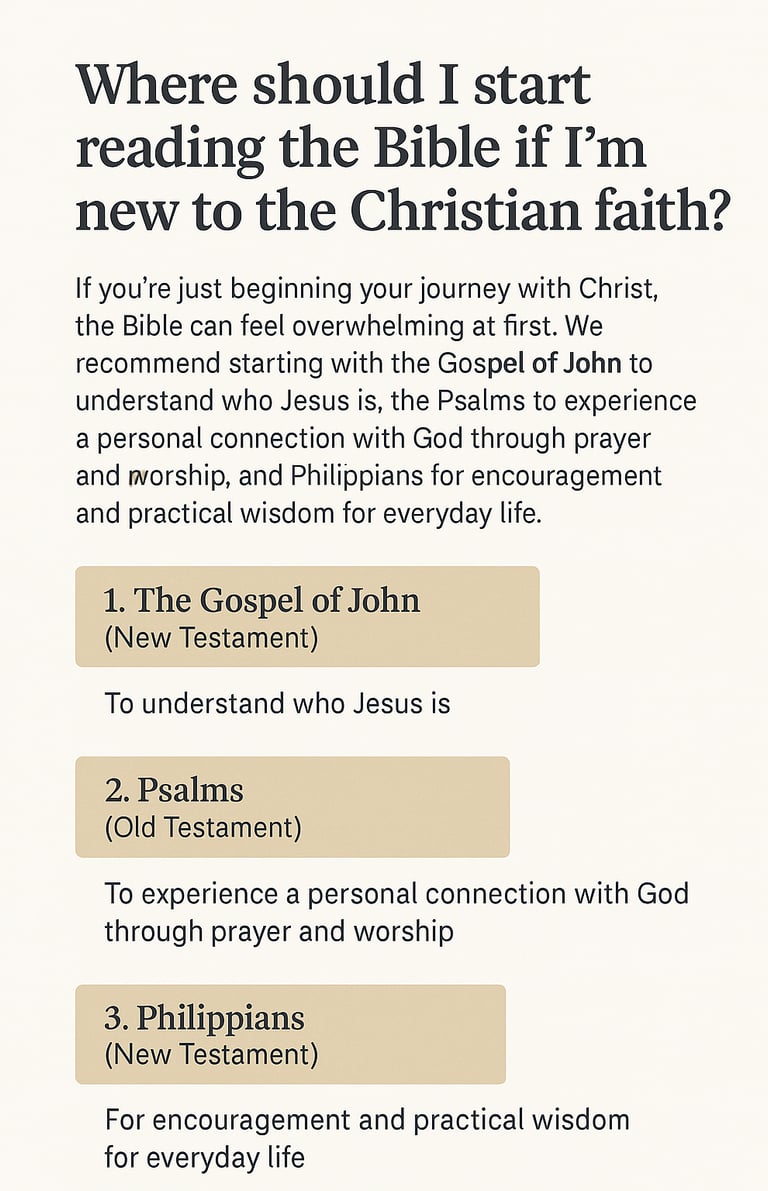Where should I start reading the Bible if I’m new to the Christian faith?
If you’re just beginning your journey with Christ, the Bible can feel overwhelming at first. We recommend starting with the Gospel of John to understand who Jesus is, the Psalms to experience a personal connection with God through prayer and worship, and Philippians for encouragement and practical wisdom for everyday life. These books will help you build a strong foundation and grow in your faith step by step.



1. The Gospel of John (New Testament)
Why: John focuses deeply on who Jesus is—His divinity, His love, and His purpose. It’s personal, relational, and filled with clear statements about faith and eternal life.
Key Themes: Belief in Jesus, eternal life, God's love, relationship with God.
Suggested chapters to meditate on: John 1, 3, 10, 14, 17.
2. The Book of Psalms (Old Testament)
Why: Psalms is a collection of honest prayers, praises, and reflections from people going through all kinds of situations—joy, sorrow, fear, faith. It teaches how to relate to God personally and emotionally.
Key Themes: Trust in God, worship, prayer, God’s faithfulness.
Suggested chapters to start with: Psalms 1, 23, 27, 34, 91, 139.
3. The Book of Philippians (New Testament)
Why: This letter, written by the Apostle Paul from prison, is full of encouragement, joy, and practical advice for living a Christ-centered life—even in difficult times.
Key Themes: Joy in Christ, humility, perseverance, peace of God.
Suggested verses: Philippians 1:6, 2:1-11, 3:12-14, 4:6-8, 4:13.
Starting Strong in Faith: A Practical Guide for New Believers
Beginning your journey with Christ can feel like stepping into a new world—beautiful, but unfamiliar. To build a strong foundation, start with three key parts of the Bible:
John: To understand who Jesus truly is—His divine nature, mission, and love.
Psalms: To grow a personal, emotional connection with God through prayer and worship.
Philippians: To gain encouragement and wisdom for daily Christian living.
Practical Application
Begin by setting aside 10–15 minutes daily. Read a short passage (e.g., John 1:1–14), then pause to reflect. Ask: What does this reveal about God? About me? How can I live this out today? Journaling your thoughts or praying through the verses deepens the experience.
Research from neuroscience shows that regular spiritual reflection, especially through reading and meditation, can physically change the brain—reducing stress, enhancing focus, and strengthening empathy. Dr. Andrew Newberg’s studies on “neurotheology” show that prayer and Scripture-based meditation activate the brain’s prefrontal cortex, promoting peace and purpose—key elements of a thriving faith.
Further Bible Reading
Romans 8 – On life through the Spirit
Proverbs 3 – For practical life wisdom
Ephesians 2 – Understanding grace and new identity
Matthew 5–7 – Jesus’ Sermon on the Mount, foundational for Christian living


Trusted Christian Resources
For Adults & New Believers:
John Lennox – “Can Science Explain Everything?” and apologetics videos blending science and faith
Wes Huff – Clear, practical Bible interpretation on social media and podcasts
The Bible Project – Animated overviews of biblical books and themes (thebibleproject.com)
For Kids & Families:
Minno – A Christ-centered streaming platform with Bible stories, worship, and discipleship content for kids
Ear to Hear – Gentle Scripture-rich audio for children, perfect for quiet time or bedtime
The Jesus Storybook Bible – A beautifully written, gospel-centered Bible for young readers
Exploring key parts of the Bible—like the Gospel of John (to encounter the love and identity of Jesus), Psalms (to connect emotionally and spiritually through honest prayer), and Philippians (to gain practical encouragement)—can offer deep peace and purpose, even for skeptics. Pairing this with trusted thinkers like John Lennox, who bridges science and faith, and using accessible resources like The Bible Project or Minno (for families), helps make the message approachable and real.
Scientifically, research from neurotheology (e.g., Dr. Andrew Newberg) shows that regular spiritual practices like prayer and meditation improve emotional resilience, reduce anxiety, and strengthen cognitive empathy. These ancient texts are more than religious doctrine—they're pathways to wholeness, identity, and meaning in an overstimulated world.
Start small. Reflect daily. And be open to the surprising possibility that faith is both intellectually credible and personally transformative.
